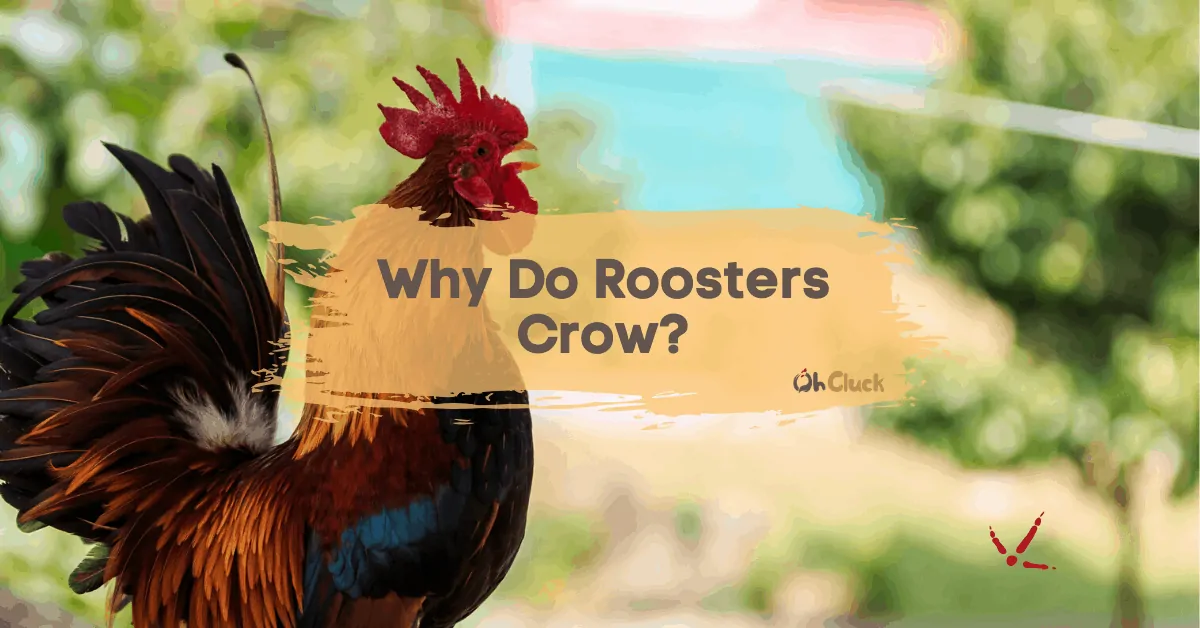Cock-a-doodle-do, if you paid attention in kindergarten, you are undoubtedly familiar with this sound and know what creates it. But why do roosters crow? Other than waking up farmers!? What’s the purpose? The answer isn’t exactly what you think; there are many different reasons a rooster might crow, some that you might not know, and a few that are pretty obvious. Let’s jump right into it.
A rooster crows to establish dominance, due to its circadian clock, self-defense, and to alert his flock of potential danger. A rooster will perch and crow above its territory to make it’s message reach farther out, making others more aware of his dominating presence.
First and most importantly, roosters will crow at any time of the day due to various stimulation, like a neighbor’s dog walking through the yard, or to communicate to a rooster a few barns down. They will even crow because of headlights seeping in through a wooded area. There is no limit to what can make a rooster crow.
Crowing At Dawn
Roosters will indeed crow just before the dawn, and in fact, it was discovered that at this time a roosters crow is at it’s highest peak in turns of volume measured in decibels. In the study, it found that with reduced stimuli, that a rooster would crow a couple of hours just before dawn. When this happened, it was considered a “precursor to dawn” a part of its circadian rhythm.
The roosters would crow the most just before dawn and until dawn peeks. Other times during the day, crowing would be less, or at lower volumes, an exciting finding.
Another part of the research, and albeit, still not fully understood, the fact that artificial stimuli didn’t affect their crowing drastically, it was interesting that they would again crow just before dawn. This was regardless of the amount of light they were given.
It was even studied with no light that roosters would still crow several hours prior to when the light was expected, indicating a possible correlation to the circadian rhythm.
A roosters crow serves multiple purposes, from establishing dominance to alerting the flock of potential dangers. But it’s also valuable to remember, a rooster will crow, day or night, he will crow whenever he feels the time is right.
Rooster Crowing Etiquette
Believe it or not, there is such thing as crowing etiquette, but what is it? Well, to make it simple to understand it is the order at which multiple roosters are allowed to crow.
Yoshimura stated, crowing is a warning signaling territorial claims. Our preliminary data suggest that the highest-ranked rooster has priority in breaking the dawn, and lower [ranking] roosters are patient enough to wait and follow the highest-ranked rooster each morning.”
In any flock a pecking order is established, that pecking order defines the order in which the rooster may crow. The Alpha rooster is always to crow first, in fact, if a rooster crows out of turn they are subject to punishment by the alpha rooster.
Competition for Pecking Order
Introducing a new rooster to your flock will undoubtedly spark up a conversation amongst the roosters, and by a discussion, I mean all-out cock-a-doodle-doing.
Competition for being the dominant rooster is a natural occurrence and happens often, crowing can signify a challenge to be the head rooster. If you have raised chickens, undoubtedly you have observed this behavior. It’s even more prevalent when a younger rooster senses that the older dominant rooster is falling ill or becoming too old to handle the roost.
Other times this might come around, and be the case is when you are introducing new roosters to your flock. In any instance, a new pecking order will be established, and it will be an all-out battle until it is.
Why Do Roosters Crow at Night
I love our roosters. I do. However, I do not enjoy being woken up in the dead of night to hearing our roosters singing the song of its people. But I do realize that these crows serve a very distinct purpose, will explain what that is and what you can do to make it stop if you so choose.
A rooster crowing at night can signal that there is a danger to the flock. After all, one of the rooster’s primary responsibility is to protect the flock, and crowing may be alerting the flock to the danger that may be present.
When a rooster crows, it’s noticed by the flock. Various crowing signals different things when it’s an alert crow; you can see hens and their chicks running to take cover, well maybe not at night… But during the day watch out for this, it’s an impressive sight to see.
If you are noticing that your roosters are crowing more often than not at night, take a look at the surroundings of your coop and run. If you see anything that can cause them to be alarmed, adjust, or remove those elements, if you can.
Crowing About Food
Roosters love eating and take pride in alerting the flock when it’s dinner time. If you haven’t noticed, throw some fresh food and hear them crow. However, watch the alpha rooster defend the food from other roosters, and allowing his hens to eat first. You will see him watching and observing and ready to chase them away from the feed.
The crow from the dominant rooster is usually indicative of possession saying, “Hey, this is mine. You can’t have none.”
How Loud Can a Rooster Crow?
Now that you know some of the reasons a rooster might crow, you may be asking: how loud can a rooster crow? Well, in short, pretty loud. Let’s break it down based on what our research has indicated.
A roosters crow can reach up to 130 decibels, this is exceptionally loud, and is compared to standing next to a jet about 15 meters away, although more commonly roosters crow around 90 decibels, which can be compared to a dog barking.
Talk about being loud, I knew roosters could be noisy, but I had no idea that another reason for crowing so loud was for self defense, but why doesn’t the rooster go deaf if it’s so loud?
It turns out that a study on this was actually completed by the University of Antwerp and the University of Brussels.
The reason a rooster doesn’t go deaf from its own vociferation is that half of the rooster’s eardrum is covered in soft tissue, this soft tissue protects it from its outcry.
In addition to the soft tissue that gives its eardrum protection, a rooster’s eardrum will actually close a quarter of the way during crowing, a fascinating discovery published by Zoology.
In summary
There are a plethora of reasons why a rooster crows, just remember the main reason a rooster may crow is most likely because he just feels like it.
But other than him feeling like it, why a rooster crows is often to establish dominance and to announce his position in the pecking order.
There is such thing as “crowing etiquette” I was a bit taken back by that one as well. Roosters establish dominance, and the order of the pecking order is voiced by the order in which they crow.
If you are around a rooster, wearing earplugs might be a good idea. A roosters crow can reach up to 130 decibels, which is louder than a dog barking and like standing next to a jet taking off. How cool is that?
If you hear your roosters crow at night, take a look around the surroundings, they could be trying to warn you of things going on around the coop. Inspect what you can and protect them while you can.
Do you have a question? Want us to answer it? Reach out to us [email protected] – We look forward to hearing from you!
Bonus Fact:
Crowing isn’t just for roosters, hens have been caught crowing as well.
A rooster that has been dominated will stop crowing. We have personally witnessed a rooster that was so badly beaten in pecking order establishment that the rooster started clucking like a hen.
Resources
https://www.sciencedirect.com/science/article/pii/S0960982213001863
http://www.itbm.nagoya-u.ac.jp/en/research/2015/07/Yoshimura-Rooster.php
https://www.cell.com/current-biology/abstract/S0960-9822(13)00186-3
https://vbs.psu.edu/adl/articles-of-interest/pecking-order-of-chickens
https://www.sciencedirect.com/science/article/abs/pii/S0944200617301976
OhCluck.com is a participant in the Amazon Services LLC Associates Program, an affiliate advertising program designed to provide a means for sites to earn advertising fees by advertising and linking to Amazon.com
Comments
0 comments

